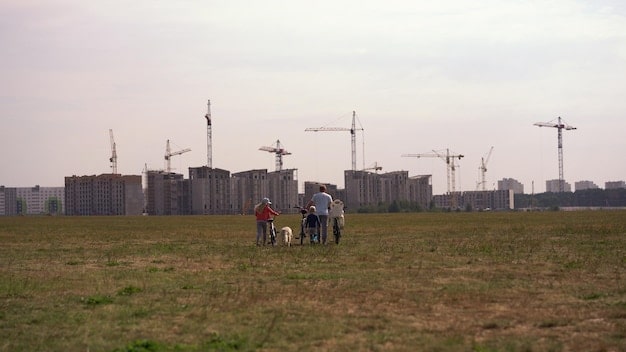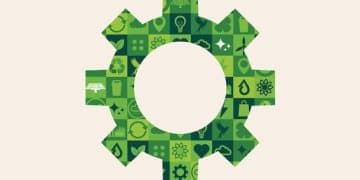Key Policy Changes Proposed in Current Congressional Session

Key policy changes proposed in the current congressional session include potential shifts in healthcare, tax laws, environmental regulations, and infrastructure spending, all designed to address current national challenges.
Staying informed about the legislative landscape is essential for understanding the future trajectory of our nation. One of the most crucial aspects of this landscape is knowing **what are the key policy changes proposed in the current congressional session**, as these changes can have significant impacts on various sectors and the lives of everyday citizens.
Understanding Current Congressional Policy Proposals
The current congressional session is a pivotal time for legislative action. Various policy proposals are being debated, each with the potential to reshape the legal and economic landscape of the country. These proposals span a wide range of issues, reflecting the diverse priorities and concerns of the American people.
Understanding the key policy debates requires not only staying informed about the proposed laws but also grasping their potential implications for different communities and industries. This involves looking at both the immediate effects and the possible long-term consequences.
Healthcare Policy Adjustments
Healthcare remains a dominant topic in congressional discussions. Recent proposals focus on lowering prescription drug costs and expanding access to affordable health insurance. These measures aim to address the rising healthcare costs and ensure that more Americans have access to necessary medical services.
Several bills have been introduced to tackle these issues, including measures that would allow Medicare to negotiate drug prices and provide subsidies for individuals purchasing health insurance through the Affordable Care Act marketplaces.
- Expanding Medicaid Eligibility: Proposals to broaden the criteria for Medicaid eligibility, aiming to cover more low-income individuals and families.
- Price Transparency Initiatives: Efforts to mandate hospitals and insurance companies to disclose pricing information, empowering consumers to make informed decisions.
- Mental Health Support: Legislation focusing on increasing funding for mental health services and integrating mental healthcare with primary care.
In conclusion, the healthcare policy adjustments under consideration in Congress reflect an ongoing effort to make healthcare more accessible and affordable for all Americans. The debates surrounding these proposals highlight the complex challenges in balancing cost control with ensuring quality care.

Tax Law Revisions Under Consideration
Tax law revisions are frequently on the congressional agenda, often driven by the need to stimulate economic growth or address income inequality. The current session is no exception, with several significant tax-related proposals under consideration. These revisions can have extensive implications for individuals, businesses, and the national economy.
The proposed tax changes address various aspects of the tax code, from individual income taxes to corporate tax rates. Debates around these revisions usually involve balancing the priorities of economic competitiveness, fairness, and fiscal responsibility.
Individual Income Tax Changes
One of the focal points of tax law revisions is the adjustment of individual income tax brackets. Some proposals suggest modifying tax rates for different income levels, aiming to provide tax relief for middle-income families or to increase taxes on higher-income earners. These adjustments can significantly affect the disposable income of households.
Another aspect is the potential changes to deductions and credits. Proposals may include expanding tax credits for families with children, enhancing incentives for charitable donations, or modifying deductions for mortgage interest. These changes are often designed to encourage certain behaviors or provide targeted financial support.
- Tax Credits for Green Energy: Proposals offering tax credits for homeowners who invest in renewable energy sources, such as solar panels or energy-efficient appliances.
- Childcare Tax Credits: Expanding childcare tax credits to assist working families with the costs of childcare services, promoting workforce participation.
- Student Loan Interest Deductions: Adjusting the deductibility of student loan interest payments, providing relief to individuals burdened by student debt.
In conclusion, the proposed tax law revisions under consideration in Congress aim to recalibrate the tax system to better align with current economic realities and policy goals. The ongoing debates reflect the diverse perspectives on how taxes should be structured to promote fairness, economic growth, and social welfare.
Environmental Regulation Modifications
Environmental regulations are continuously evolving to address the pressing challenges of climate change and environmental degradation. Congressional modifications in this area aim to balance economic development with the need to protect natural resources and public health. These adjustments often involve updating existing regulations or introducing new ones.
These modifications involve both tightening and loosening existing environmental protections. The focus includes promoting renewable energy, reducing pollution, and conserving natural habitats.
Clean Air and Water Standards
One of the primary areas of focus is updating the standards for clean air and water. Proposals include strengthening regulations to limit emissions from industrial facilities and vehicles, as well as enhancing monitoring and enforcement mechanisms.
Another critical aspect is addressing water pollution. Proposals may include tightening regulations on wastewater discharge from factories and agricultural operations, along with initiatives to protect and restore wetlands and other critical water sources.
- Incentives for Sustainable Farming: Programs offering financial incentives for farmers who adopt sustainable farming practices, reducing soil erosion and water pollution.
- Renewable Energy Mandates: Legislation mandating higher percentages of electricity generation from renewable sources, such as solar, wind, and hydropower.
- Conservation Easements: Expanding the use of conservation easements to protect natural habitats and prevent development on environmentally sensitive lands.
In conclusion, the environmental regulation modifications being discussed in Congress reflect a growing awareness of the need to address environmental challenges proactively. The debates emphasize a commitment to balancing economic growth with environmental stewardship and ensuring a sustainable future.
Infrastructure Spending Initiatives in Local Politics
Infrastructure spending is essential for modernizing the transportation, communication, and energy systems. Congressional initiatives in this area aim to stimulate economic growth, create jobs, and improve the overall quality of life. These initiatives can involve funding for roads, bridges, public transit, broadband internet, and other critical infrastructure projects.
These initiatives serve as a catalyst for economic development and job creation. They address critical needs in transportation, communication, and energy.
Transportation Infrastructure Enhancements
A significant part of infrastructure spending is allocated to transportation projects. This includes funding for repairs and upgrades to roads and bridges, as well as investments in public transportation systems, such as buses, trains, and light rail.
Another key aspect is modernizing transportation infrastructure to accommodate electric vehicles and autonomous driving technologies. Proposals may include funding for charging stations, smart traffic management systems, and other innovations.
- Broadband Expansion Grants: Grants to support the expansion of broadband internet access in rural and underserved areas, bridging the digital divide.
- Water Infrastructure Upgrades: Funding for upgrading water and sewer systems to ensure access to clean and safe drinking water and prevent water pollution.
- Public Transit Modernization: Investments in modernizing public transit systems to improve efficiency, reduce congestion, and promote sustainable transportation options.
In conclusion, the infrastructure spending initiatives being considered by Congress aim to revitalize the nation’s infrastructure and enhance economic competitiveness. These investments are intended to provide long-term benefits to businesses, communities, and individuals.

Education Policy Reforms Under Consideration
Education policy reforms are crucial for equipping students with the skills and knowledge needed to thrive in a rapidly changing world. Congressional discussions in this area aim to improve educational outcomes, reduce disparities, and prepare students for college and careers. These reforms can involve funding for schools, curriculum changes, and teacher training programs.
These reforms focus on enhancing educational quality and accessibility. They address issues such as funding disparities and college affordability.
K-12 Education Improvements
One of the primary areas of focus is improving the quality of K-12 education. Proposals include increasing funding for schools, particularly those in underserved communities, as well as implementing reforms to curriculum and teaching methods.
Another critical aspect is enhancing teacher training and professional development. Proposals may include funding for programs that provide teachers with ongoing training and support, helping them stay up-to-date with the latest educational research and best practices.
- College Affordability Measures: Initiatives to make college more affordable, such as expanding Pell Grants and capping student loan interest rates.
- Early Childhood Education Investments: Investments in early childhood education programs to help children develop strong cognitive and social-emotional skills from a young age.
- Vocational Training Opportunities: Expanding vocational training opportunities to prepare students for careers in high-demand industries.
In conclusion, the education policy reforms being discussed in Congress reflect a commitment to improving educational opportunities for all students, regardless of background or circumstance. These reforms are designed to ensure that students are well-prepared for the challenges and opportunities of the 21st century.
Immigration Law Adjustments on the Horizon
Immigration law adjustments are continually being debated in Congress due to growing demands. Discussions in this area seek to address border security, provide pathways to citizenship, and meet workforce needs. These adjustments can involve changes to visa programs, border enforcement policies, and immigration quotas.
These adjustments involve addressing border security and workforce needs. They focus on legalizing undocumented immigrants and streamlining visa programs.
Border Security Enhancements
One of the primary areas of focus is enhancing border security. Plans involve heightened surveillance technology, increased border patrol personnel to monitor and protect the US borders. These efforts are aimed at preventing illegal immigration and drug trafficking.
Another key aspect is addressing the status of undocumented immigrants already living in the United States. This may include creating pathways to citizenship for long-term residents who meet certain requirements, such as passing background checks and paying taxes.
- Visa Program Reforms: Reforming visa programs to better meet the needs of employers and ensure that foreign workers are protected from exploitation.
- Asylum Process Improvements: Improving the asylum process to ensure that claims are processed quickly and fairly, while also addressing concerns about fraudulent claims.
- Family Reunification Policies: Revising family reunification policies to prioritize the reunification of families separated by immigration laws.
In conclusion, the adjustments to immigration laws being analyzed by Congress reflect the ongoing challenges of balancing border security, economic needs, and humanitarian concerns. The debates emphasize a dedication to creating a fair and effective immigration system.
| Key Point | Brief Description |
|---|---|
| ⚕️ Healthcare Costs | Efforts to lower drug prices and expand insurance access. |
| 🌱 Environmental Regulations | Updates to clean air and water standards to protect resources. |
| 🚧 Infrastructure Investments | Funding transportation, broadband, and energy modernization. |
| 🎓 Education Reform | Improving K-12, college affordability, and vocational training. |
Frequently Asked Questions
▼
The main focus is to lower prescription drug costs and expand access to affordable health insurance, ensuring more Americans have necessary medical services.
▼
Tax law revisions may adjust income tax brackets, potentially providing tax relief for middle-income families or increasing taxes on higher-income earners.
▼
The aim is to balance economic development with environmental protection by updating standards for clean air and water, and promoting renewable energy.
▼
They are essential for modernizing systems, stimulating economic growth, creating jobs, and improving the overall quality of life through various projects.
▼
The reforms seek to improve educational outcomes, reduce disparities, and prepare students for college and careers by enhancing curriculum and teacher training.
Conclusion
Keeping track of the key policy changes proposed in the current congressional session is vital for understanding the evolving legislative landscape. These proposed changes have far-reaching implications for healthcare, tax laws, the environment, infrastructure, and education. Engaging with these changes promotes civic participation and informs decision-making at all levels. By understanding these key policy shifts, one can prepare for and contribute to the future direction of our communities and the nation.





